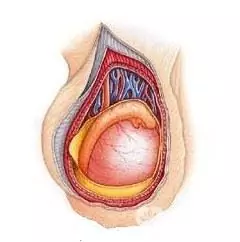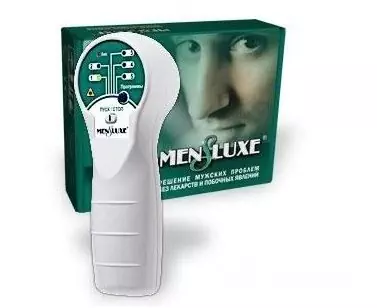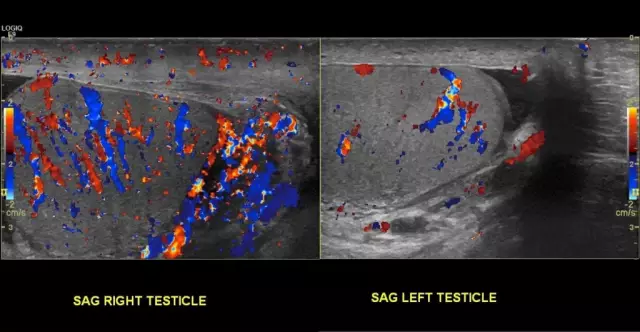- Author Rachel Wainwright wainwright@abchealthonline.com.
- Public 2023-12-15 07:39.
- Last modified 2025-11-02 20:14.
Orchitis

Orchitis is an inflammation of the testicle. This disease is often encountered in urological practice, however, as a rule, it does not arise on its own, but is the result of a complication of general infectious processes in the body.
Orchitis reasons
The most common cause of orchitis is the spread of a sexually transmitted infection (STI) from other organs of the genitourinary system to the testicle. Such pathogens include gonococci, Trichomonas, chlamydia, mycoplasma, ureaplasma. The second most common cause of orchitis is the introduction of an infection with the bloodstream, most often orchitis is caused by the mumps virus, popularly called mumps. In addition to the causative agent of mumps, orchitis can be caused by the influenza virus, the chickenpox virus, and pneumococcus, and others. In some cases, orchitis occurs as a result of an autoimmune process, such as rheumatic fever. Orchitis can also appear as a result of testicular injury or as a complication after surgery in the male external genital area.
Orchitis symptoms
According to the nature of the course, acute orchitis and chronic orchitis are distinguished, inflammation, as a rule, occurs on one side, but in about 10% of cases, orchitis symptoms appear in both testicles.
Acute orchitis has an abrupt onset. The first symptom of orchitis is severe pain in the testicle, aggravated by movement, the testicle evenly increases in size, the skin of the scrotum above it stretches, becomes smooth, hot and hyperemic, touching causes sharp pain. Acute orchitis is accompanied by a general deterioration of the condition: the body temperature rises to 38 - 40 ° C, fever joins, head and muscle pains, weakness appear. When active therapeutic measures are taken, the symptoms of orchitis disappear in 7-10 days, if the disease is not treated, there are three ways for the development of the process: self-healing may occur within 2-3 weeks, the disease may become chronic or an abscess (purulent inflammation) of the testicle will develop.
Chronic orchitis may be due to untreated acute orchitis, or it may be primary chronic, i.e. the infectious process occurs immediately as a chronic one, usually this is characteristic of orchitis caused by STIs. In this case, the symptoms of orchitis may be absent altogether, and the disease is detected by chance during examination for infertility, which often leads to chronic orchitis. The only symptom of orchitis in its chronic form, as a rule, is minor pain in the testicle, usually appearing with a certain position of the body or feeling.
Diagnosis of orchitis
The diagnosis of orchitis is made on the basis of anamnesis data (past diseases, injuries, etc.), external examination of the external genitalia and ultrasound examination. Great importance is attached to identifying the causative agent of the disease, since the treatment of orchitis depends on this, therefore, studies are carried out to identify STIs; a general analysis of blood and urine is also taken, a testicular puncture is performed with a laboratory study of punctate.
Orchitis treatment
Treatment of acute and chronic orchitis is somewhat different, however, in either case, the main measures should be aimed at curing the underlying disease that led to the onset of orchitis.
In acute orchitis, a shock course of antibiotic therapy is prescribed, for which broad-spectrum antibiotics are used, since rapid vigorous measures are required, and there is no way to wait for the results of bacterial culture. In combination with them, non-steroidal anti-inflammatory and analgesic drugs are prescribed. The patient is prescribed bed rest, and in case of physical activity, it is necessary to wear a suspensor - a special bandage that supports the testicle in a certain position. With a pronounced pain syndrome, blockade of the spermatic cord is performed using an injection of anesthetics. Fatty, fried and spicy foods, as well as alcohol, are excluded from eating for the period of treatment.
Treatment of chronic orchitis must be consistent and persistent, since chronic orchitis is difficult to treat, but can cause male infertility. As in the treatment of acute orchitis, antibacterial drugs are prescribed, but they are carefully selected in accordance with the data of bacterial research. As a rule, the treatment of chronic orchitis requires several courses of antibiotic therapy with different drugs, in combination with hormonal anti-inflammatory drugs. In parallel, physiotherapeutic methods are actively used: UHF therapy, magnetotherapy, laser therapy, warming compresses and warm sitz baths. The same therapeutic measures are prescribed for the treatment of acute orchitis in the stage of inflammation subsiding, but in smaller courses. Chronic orchitis treatment also requires diet and bad habits.
Complications of orchitis
The most common complication of acute orchitis is the development of pyocele, a purulent inflammation leading either to melting of the testicle or to the formation of a fistula. Such complications are treated surgically, for which the testicle is opened, washed with antiseptics and drained. If a fistula is formed, it is excised and sutured. If there is a complete purulent fusion of the testicle, an operation is performed to remove it - orchiectomy.

A complication of chronic orchitis is infertility as a result of a decrease in the secretory function of the testicle, in some cases the chronic process can lead to testicular atrophy or hydrocele - testicular dropsy. Untreated chronic orchitis leads to the appearance of other inflammations of the genitourinary system, and as a constant focus of chronic infection to a decrease in immunity with all the ensuing consequences.
Orchitis prognosis
Acute orchitis has a more favorable prognosis than chronic orchitis in terms of further male health. As a rule, with timely treatment measures, acute orchitis disappears without a trace. Chronic orchitis is treated with great difficulty, requires perseverance from both the doctor and the patient, but sometimes, even if completely cured, the secretory function of the testicle can be significantly reduced. Particularly dangerous in this sense is bilateral orchitis, transferred in childhood and adolescence. As a prophylaxis of the disease, timely, as early as possible treatment of orchitis is of great importance.
YouTube video related to the article:
The information is generalized and provided for informational purposes only. At the first sign of illness, see your doctor. Self-medication is hazardous to health!






